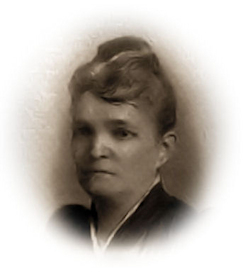May 26.—During the past week we have lived somewhat like Venetians, with a boat at front steps and a raft at the back. Sunday H. and I took skiff to church. The clergyman, who is also tutor at a planter’s across the lake, preached to the few who had arrived in skiffs. We shall not try it again, it is so troublesome getting in and out at the court-house steps. The imprisonment is hard to endure. It threatened to make me really ill, so every evening H. lays a thick wrap in the pirogue, I sit on it and we row off to the ridge of dry land running along the lake-shore and branching off to a strip of woods also out of water. Here we disembark and march up and down till dusk. A great deal of the wood got wet and has to be laid out to dry on the galleries, with clothing, and everything that must be dried. One’s own trials are intensified by the worse suffering around that we can do nothing to relieve.
Max has a puppy named after General Price. The gentlemen had both gone up town yesterday in the skiff when Annie and I heard little Price’s despairing cries from under the house, and we got on the raft to find and save him. We wore light morning dresses and slippers, for shoes are becoming precious. Annie donned a Shaker and I a broad hat. We got the raft pushed out to the center of the grounds opposite the house and could see Price clinging to a post; the next move must be to navigate the raft up to the side of the house and reach for Price. It sounds easy; but poke around with our poles as wildly or as scientifically as we might, the raft would not budge. The noonday sun was blazing right overhead and the muddy water running all over slippered feet and dainty dresses. How long we staid praying for rescue, yet wincing already at the laugh that would come with it, I shall never know. It seemed like a day before the welcome boat and the “Ha, ha!” of H. and Max were heard. The confinement tells severely on all the animal life about us. Half the chickens are dead and the other half sick.
The days drag slowly. We have to depend mainly on books to relieve the tedium, for we have no piano; none of us like cards; we are very poor chess-players, and the chess-set is incomplete. When we gather round the one lamp—we dare not light any more—each one exchanges the gems of thought or mirthful ideas he finds. Frequently the gnats and the mosquitoes are so bad we cannot read at all. This evening, till a strong breeze blew them away, they were intolerable. Aunt Judy goes about in a dignified silence, too full for words, only asking two or three times, “W’at I dun tole you fum de fust?” The food is a trial. This evening the snaky candles lighted the glass and silver on the supper-table with a pale gleam and disclosed a frugal supper indeed—tea without milk (for all the cows are gone), honey, and bread. A faint ray twinkled on the water swishing against the house and stretching away into the dark woods. It looked like civilization and barbarism met together. Just as we sat down to it, some one passing in a boat shouted that Confederates and Federals were fighting at Vicksburg.
Note: To protect Mrs. Miller’s job as a teacher in post-civil war New Orleans, her diary was published anonymously, edited by G. W. Cable, names were changed and initials were generally used instead of full names—and even the initials differed from the real person’s initials. (Read Dora Richards Miller’s biographical sketch.)
